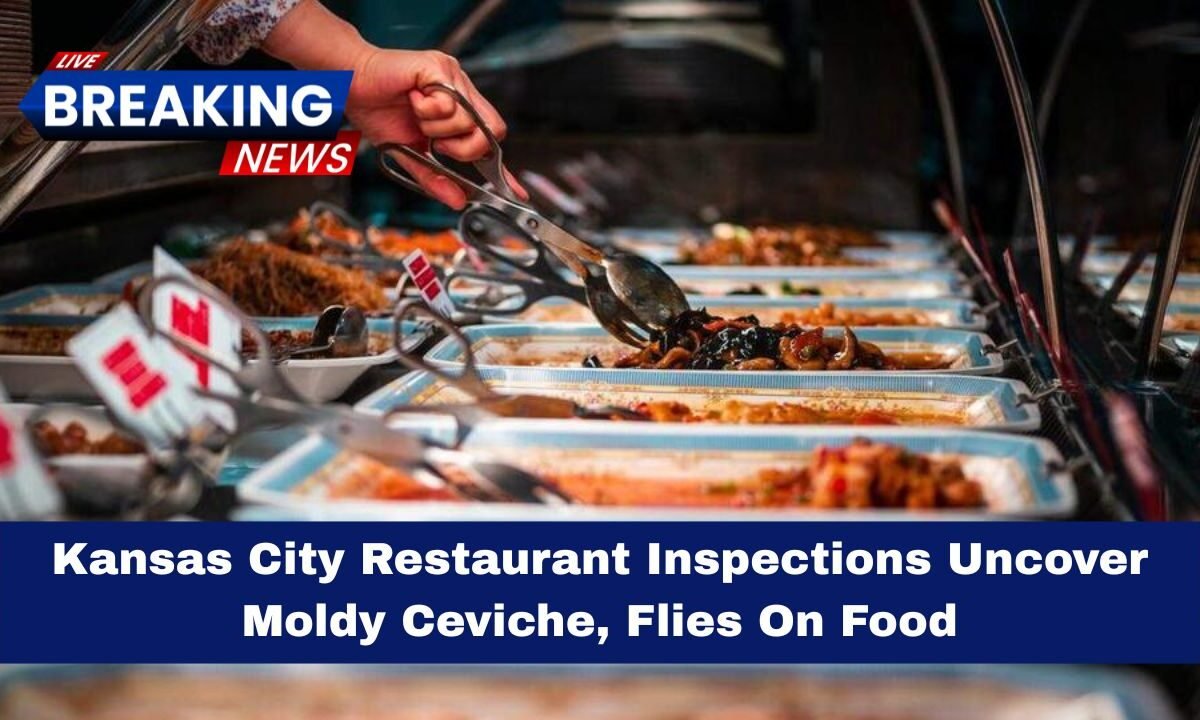Health inspectors in the Kansas City area recently uncovered a series of troubling violations at restaurants, drive-thrus, gas stations, and grocery stores.
From moldy ceviche to flies on pizzas and even cockroaches in kitchens, the latest inspection reports highlight serious lapses in food safety. These findings are a wake-up call for both diners and business owners, showing how quickly unsafe conditions can put public health at risk.
This article provides a detailed breakdown of the violations, the restaurants involved, what the inspection system requires, and what consumers should keep in mind when choosing where to eat.
Major Violations Found in Kansas City Inspections
Below is a summary of the restaurants cited for seven or more critical or priority violations between August 31 and September 6, 2025:
| Restaurant | Location | Type of Inspection | Key Violations Found |
|---|---|---|---|
| El Toro Loco Legends | Kansas City, KS | Complaint Inspection (Sept 2) | Mold on ceviche; around 30 small insects flying around bar glasses; old food debris on knives, microwave, and under appliances. |
| Pho Good | Shawnee, KS | Joint Inspection (Sept 3) | Decaying sweet potatoes; 5-10 dead bugs in a produce box; black and brown growth inside ice machine; cracked sugar container lid patched with wood and staples. |
| Steak‘m Take‘m | Kansas City, MO | Routine Inspection (Sept 3) | Four live cockroaches and several dead ones; bathroom lacked hand soap and paper towels. |
| Tea Garden | Olathe, KS | Follow-Up Inspection (Sept 4) | Refrigerator not cooling properly, spoiled raw chicken and other foods discarded; employee refused to wash hands at proper sink. |
| Leone Original Pizza | Overland Park, KS | Routine Inspection (Sept 2) | Two flies landed on a piece of pizza; expired carrot and limoncello cakes in cooler. |
These violations are classified as critical or priority foundation violations—problems that directly endanger consumer health if not immediately corrected.
How the Inspection System Works
Kansas City and surrounding counties require every food establishment to comply with strict food safety codes. Here’s how the system typically works:
- Routine inspections are carried out on a schedule, ensuring ongoing compliance.
- Complaint inspections are triggered when a customer reports unsafe food, pests, or unclean conditions.
- Follow-up inspections check whether violations were fixed after a prior visit.
- Priority and critical violations include improper food storage, pest infestations, unclean equipment, and poor employee hygiene.
- If serious issues remain uncorrected, inspectors can suspend operations until the problems are resolved.
The inspection process is designed not just to punish but to improve compliance and protect diners.
Why These Violations Are Alarming
Food safety is a non-negotiable standard. When restaurants fail, the risks go far beyond a bad dining experience:
- Health hazards: Mold, spoiled food, insects, and cockroaches are major carriers of bacteria and pathogens that cause foodborne illness.
- Erosion of trust: Diners expect clean kitchens and safe meals. Violations like these damage reputations and reduce customer loyalty.
- Financial loss: Restaurants with repeated violations can face fines, closures, or lawsuits, which often cost more than maintaining proper hygiene.
- Community impact: Outbreaks of food poisoning can spread quickly, overwhelming healthcare systems and harming vulnerable populations.
Accountability and Corrective Action
Most violations are corrected during inspections. For example, spoiled items may be discarded immediately, sinks restocked with soap, and contaminated surfaces cleaned.
But follow-up inspections are critical, as some problems—such as faulty refrigeration, pest infestations, or structural repairs—require time and effort to fix properly.
If establishments fail to comply, their licenses can be suspended until they demonstrate safe operating conditions. For restaurants, accountability is not optional—it’s a condition of doing business.
What Consumers Should Do
Consumers have a role to play in protecting themselves and holding businesses accountable:
- Be observant when dining out – Look around for visible cleanliness, employee hygiene, and whether food areas look well maintained.
- Report unsafe conditions – If you spot pests, spoiled food, or other hazards, report them to the local health department.
- Stay updated on inspection results – Many inspection databases are publicly available, letting customers see if their favorite spots are safe.
- Remember one violation doesn’t always mean closure – Minor or corrected violations are common, but repeated or serious ones are a red flag.
The Bigger Picture- Food Safety in Restaurants
These inspection results highlight recurring issues many food businesses face:
- Improper food storage temperatures leading to spoilage.
- Pest control problems caused by poor sanitation or facility gaps.
- Employee hygiene failures, like refusing to wash hands or not using the correct sinks.
- Expired products left on shelves and served to customers.
The lesson is clear: safe food handling is not optional—it’s essential. Restaurants that ignore this risk more than fines; they risk customer health and their own survival.
The recent restaurant inspections in Kansas City uncovered alarming violations such as moldy ceviche, cockroaches in kitchens, expired cakes, and flies on pizzas. These findings remind us that food safety cannot be taken for granted.
While most restaurants correct issues quickly, some cases reveal deeper problems that must be addressed to protect public health.
For diners, the key takeaway is clear: stay informed, remain observant, and support restaurants that prioritize hygiene and safety. For businesses, the message is even stronger—safe practices are the foundation of trust, reputation, and long-term success.




